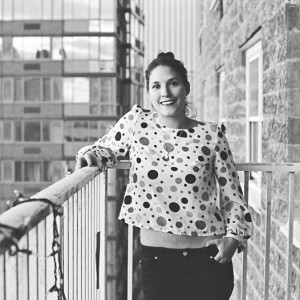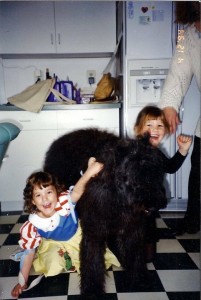#WriteOnSarah: Heading Off To College With The Wrong Diagnosis

When Tess Kaytmaz left for college, she took with her a long history of therapy and a diagnosis of ADHD, a label and identity the adults in her life had given her, despite her sense that they’d gotten it all wrong. Growing up with the disconnection between a diagnosis and what she felt inside sent an implicit message: I must not know my own body or emotions.
Tess also suffered from anxiety, but the medication for ADHD and the sense that it, more than her anxiety, was the condition that needed to be addressed, created a deep struggle for her.
“I remember hiding meds in my cactus, digging it under the soil, so I could express myself,” she said.
In college, Tess learned that her mother had been communicating with her therapist without her knowledge, aiming to continue the treatment for ADHD Tess objected to. It was the last straw. She cut ties with the therapist and began a new course of treatment with a counselor at college. It was then, Tess said, that she finally felt understood. And the new diagnosis, which included anxiety disorders but not ADHD, came as a joyful relief.
I believe this story is important for parents and young adults, especially those in college. While it is true that a diagnosis can change throughout the course of a person’s life, the larger issue here relates to growing up with mental illness and seeking to be understood. It also brings up questions about the delicate nature of parenting and being parented—how much is too much, where do the lines of privacy get drawn, does each party have the same understanding of the ground rules, and what is the consequence of overreaching or not doing enough? Suicide is a leading cause of death for young people ages 15-34.
This story, however, is not about that aspect of young adulthood. Tess struggled, but emerged stronger and more confident. She feels no stigma associated with mental illness, and, much like me, has been so moved by the process of more accurately identifying and managing what was going on inside, that she wants to share the story with others, in hopes it might save them some pain along the way. So I asked 25 year old Tess Kaytmaz, a few questions about her life.
1. What was your first experience with therapy or being told you had a mental illness? What symptoms did you experience that your parents noticed?
I was four years old actually when I first started therapy. I remember having to take all these tests. I had to make a plate of how I was feeling. I remember getting stressed out when I was told to play with dolls and a dollhouse. It makes sense now why it would stress me out. My grandfather, who was my best friend, has just passed away. My mother went into a depression (an assumption I make now from what I remember of her symptoms), and my dad was never one for emotion. I didn’t know what a normal household (or dollhouse) seemed like.
Growing up, I didn’t have an actual idea that therapy was still a taboo subject, and everyone didn’t have a therapist. As for symptoms, they noticed it was hard for me to sit still, or to concentrate fully. The issue is kids have the same, or similar, symptoms when they have ADHD or anxiety. Because my mom and my sister have ADHD it seemed logical that I would have ADHD too.
I don’t have ADHD. But being misdiagnosed with it changed the trajectory of my life.
2. Describe how this made you feel like a child and student?
As a child, it made me feel like a freak. I was bullied a lot. Even if I did make friends, I would end up having panic attacks because I got so scared about looking stupid or messing up.
As a student, it made me extremely angry. As a fourth grader A Midsummer Night’s Dream was my favorite book. I had the monologues memorized and I read them out loud in iambic pentameter. But I was still put in the lowest classes, reserved for the trouble students.
I remember in high school when the school college counselor sat me down and told me in a surprised voice that I got one of the top reading scores in my class on the ACTs . And I looked at him with an unsurprised face and said something like, “duh, I never leave the house without two books in my purse or car.”
Schools keep their students in a certain box and don’t like letting them leave it.
3. Describe the process of diagnosis and treatment and what progress or lack of it you made:
Honestly, it was just a lot of testing. So much testing, it’s exhausting! Truly, it is. The thing that made me the most frustrated was that no matter what I said, the adults’ words held more water than my words. I remember thinking, “Well, apparently I don’t know my body and emotions.”
That still affects me now. My friends know that when they get a text or call from me that they just need to tell me my feelings are valid.
4. When did you seek an independent diagnosis?
When I got to college. I learned my mother had been emailing the therapist behind my back to get her to encourage me to do what she wants me to do. When I found that out, I called and told the therapist that I could no longer be her patient because our trust was broken.
That hurt a lot, because I loved my therapist. I wish I could email her now and thank her for her help during those years.
5. What did you discover?
The first session with the college counselor, I accidentally made her cry. That actually felt nice because I finally got the validation I needed that I wasn’t insane for feeling pain when I thought about my life. I then learned how to work with my anxiety instead of fighting it. I learned the best ways to calm myself down. I also started to learn just exactly how strong I could be.
6. How did you integrate the new diagnosis and therapy into your life?
While I knew since 8th grade that I didn’t have ADHD, it wasn’t until I reached college that I could live a life without someone fighting with me about that and telling me that they knew what was going on in my head better than they did.
It was refreshing to finally be able to label myself.
I will proudly own up to having anxiety disorders because for so long I was labeled with the wrong disorders.
Since the accurate diagnosis, I have had a sense of pride and ownership, which honestly has made all of the difference.
7. Describe your life and relationship with your mental illness now?
It’s very much the definition of a love-hate relationship. On one hand, it will debilitate me sometimes. I freak out when I logically know I don’t have to. I would love to do certain things but I can’t because they trigger a panic attack. I’d even like to drink coffee again –WaWa’s Raspberry Ice tea to be specific.
But mental illness manages to bless me with a lot of things: My problem solving and deductive reasoning skills are stellar. I can read a person’s body language pretty quickly, which is a plus when networking. I have friends of all ages and backgrounds. And I can smell someone playing games from a mile away, and have none of it. I’ve managed to cultivate the most supportive and loving community, which tends to make up for the disadvantages.
8. What do you wish your parents had done differently? What do you wish you’d been able to say as a child?
Honestly, I don’t wish they did anything differently. To ask that would be for me to ask them to change fundamental personality traits. I might as well just say I wish I had different parents. And while it crosses my mind, “who would I be if they’d done things differently” I realize I wouldn’t be me and I wouldn’t have my friends. My friends have stuck furiously by my side during all of this, and to have one person, let alone a whole community, well I wouldn’t give that up for the world.

Sarah Vander Schaaff is a writer, blogger and a mother of two from New Jersey, who has struggled with Obsessive-compulsive disorder for as long as she can remember. Her courageous column in the Washington Post (“Obsessive –compulsive disorder nearly ruined her life”, January 4th) received international attention for its honesty and openness. This is the first blog in a regular series for Sarah who will write about the mental health challenges we all face in day to day life.
